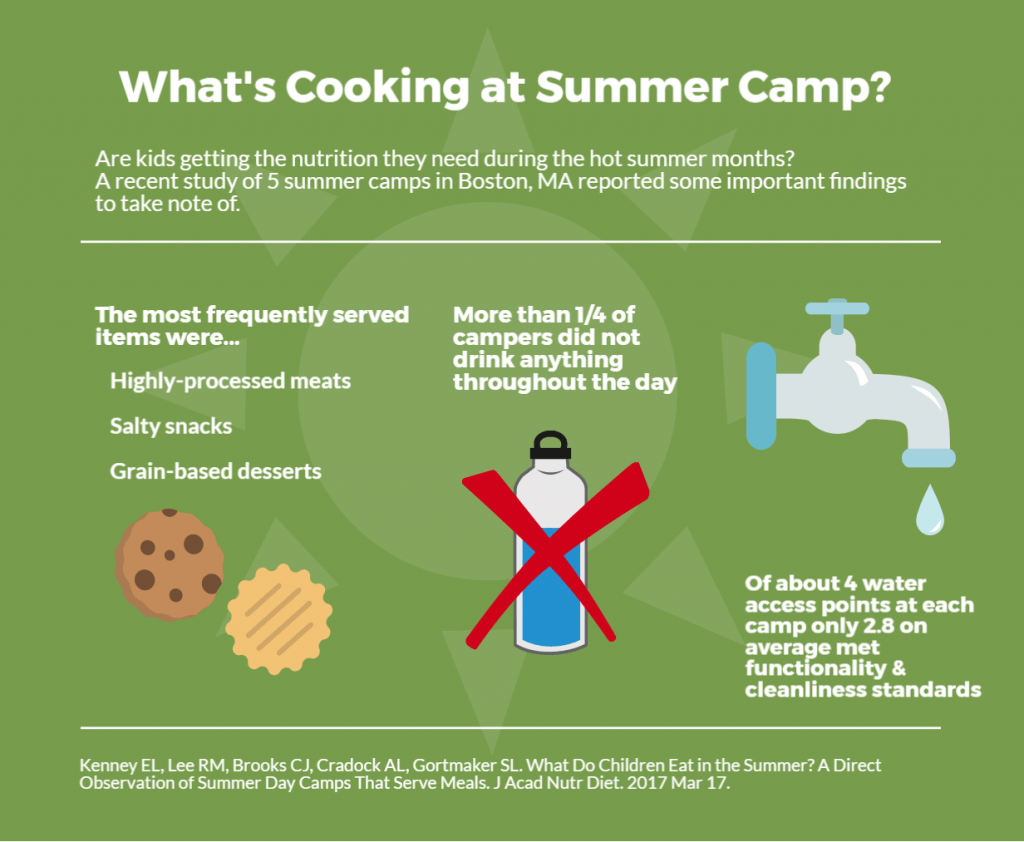This study from the Harvard T. H. Chan School of Public Health directly observed the nutritional quality of meals served at 5 summer camps in the Boston, MA area, and reported some important results.
Food and beverages served at summer camps could have major impacts on children’s nutrition, yet minimal research has been done to find out what is even served at summer camp. In a recent study of 5 summer day camps in Boston, MA, Kenney et al. (2017) found that there was room for improvement with regards to the nutritional quality of the food and beverages served at each camp, that children frequently brought sugar-sweetened beverages, candy, and salty snacks into camp, and that water and even other beverages were rarely consumed. The researchers documented the food and beverages served, the dietary intake of campers, and the camp’s access to clean, functioning water sources. They compared what the camps served and what the campers ate to a set of best practice nutritional standards developed by the Institute of Medicine (IOM).
The researchers reported several significant findings. In terms of the nutritional quality of items served, while both breakfast and lunch aligned with the IOM recommendations for total energy content, the total energy content for snacks was more than double the IOM recommendation. Vegetables were rarely served at all, and fruits and vegetables were almost never served at snack. While sugary fruit juice was served very frequently, water was never served.

The researchers also found that campers did not consume much of the items served to them. Healthy food or beverage options were less likely to be consumed by campers. Beverage consumption was limited, as roughly half of campers at each meal or snack time did not consume a beverage and, overall, 27.3% of all campers did not drink anything at any meal or snack time throughout the day. Campers were, however, more likely to consume sugar-sweetened beverages (SSBs) and candy brought from home, fruit, highly-processed meats, salty snacks, and grain-based desserts.
In general, campers did not consume enough food or beverages (especially water) throughout the day, and less healthy items were more popular than healthier options when campers did eat or drink anything. The findings of this study highlight the need for both improvement in the nutritional quality of food and beverages served at summer camps as well as further research on this topic, especially on palatability of healthier food options from food service vendors. Efforts must also be made to appeal healthy options to children.
Learn more about water access and consumption as well as healthy eating for children by checking out some of the HPRC’s resources for obesity prevention.
Media Coverage
Coping with Camp Food: Preserving Your Kids’ Healthy Eating Habits
– It’s Not About Nutrition, Dina Rosa, PhD
Kenney EL, Lee RM, Brooks CJ, Cradock AL, Gortmaker SL. What Do Children Eat in the Summer? A Direct Observation of Summer Day Camps That Serve Meals. J Acad Nutr Diet. 2017 Mar 17.